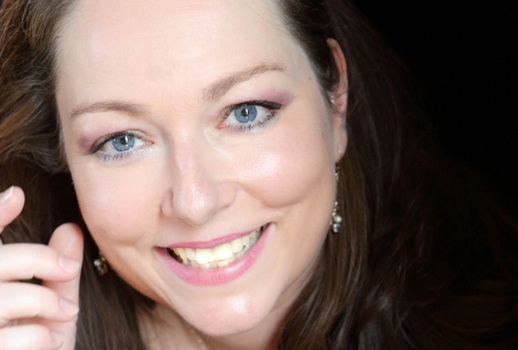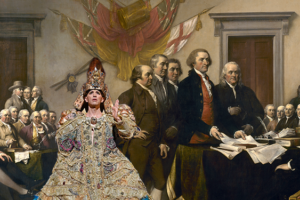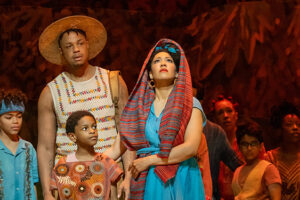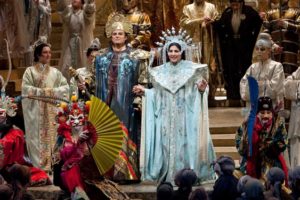

Given that over the past several weeks it was announced that next year Röschmann will be debuting important new roles by Verdi and Janácek , one might have assumed that she had abandoned works like Dido and Aeneas. To judge from the hearty response of the Carnegie audience she had a personal success but my reactions were slightly more ambivalent.
As a young singer Röschmann was taken up by a number of leading Early Music conductors, particularly Nikolaus Harnoncourt who remains her greatest champion. The interest in historically-informed performing practices was at its height in the 1990s. and record companies were pushing out lots of new “old” repertoire: the earliest CD of Röschmann’s I could find in my library was Johann Joseph Fux’s 1728 oratorio La Deposizione dalla Croce di Gesù Cristo Salvador Nostro with the HIP orchestra the Wiener Akademie under Martin Haselböck recorded when she was just 25.
Röschmann had an unusually distinctive voice for that repertoire, one full of color and tang, unlike many of the purer, more boyish sopranos who dominated the baroque recordings of that era.
The voice could also grow a bit harsh and wiry at times—her Arianna in Giustino recorded at the 1994 Göttingen Handel Festival in one such case in point.
Her big break came in 1995 singing Susanna in Le Nozze di Figaro with Harnoncourt at the Salzburg Festival. Even while she has moved on to become an acclaimed concert singer and recitalist, Mozart has remained the cornerstone of her operatic life. Her Metropolitan Opera debut arrived in the fall of 2003 when her vibrant Susanna stole the show from that evening’s other debutante, Anja Harteros as the Countess. By then, the voice had filled out becoming bigger and warmer while still retaining its distinctive, subtle vibrato—her glowing Pamina was the high point of the premiere of the Julie Taymor production of Die Zauberflöte at the Met the next year.
The soprano then began to then expand her repertoire in ways that surprised some. She had a signal success in the unexpected role of Vitellia in Salzburg.
She tried out the Marschallin in Der Rosenkavalier in concert with the Cleveland Orchestra in 2007, the same year she canceled an entire run of Nozze at the Met where she would have sung her new role of the Countess. And, more controversially, she undertook two new Wagner roles at the Berlin Staatsoper, her home theater: Eva in Die Meistersinger in 2008 and Elsa in Stefan Herheim’s controversial Lohengrin in 2009—both during the annual prestigious Festtage. Neither was judged a success and she has never sung either role again.
Rumors soon grew of a vocal crisis, including a now parlous upper-register. While keeping up a busy concert and recital schedule—I heard her in a lovely Mahler concert of the Fourth Symphony and some songs from Das Knaben Wunderhorn with Pierre Boulez and the Berlin Staatskapelle in 2009—her operatic schedule soon shrank to virtually just two roles: the Countess and Donna Elvira.
But there have been tentative forays again beyond Mozart—for Harnoncourt in 2011 she sang Smetana’s Marenka and this February she was Agathe in the Staatsoper’s new production of Der Freischütz and she has begun to sing the Marschallin regularly on stage. However, the news that Röschmann would be undertaking her first Desdemona in a new production of Otello at next year’s Salzburg Easter Festival must have surprised many, so too the announcement of her first Jenufa at the Vienna Staatsoper in April 2016.
Though she sang Handel’s Rodelinda in Munich in 2004, I can’t find any other evidence that the soprano has returned to pre-Mozart opera in Europe. However, American presenters, particularly at Carnegie Hall, seem to have other ideas—in 2011 she joined David Daniels in a misbegotten all-Handel concert with Juilliard 415, that school’s HIP student orchestra.
And last year she sang an uneven Theodora during the American portion of The English Concert’s tour of Handel’s oratorio, whereas Rosemary Joshua sang the European performances. So I admit that I arrived at Carnegie Hall on Sunday for Dido, as well as excerpts from King Arthur and The Fairy Queen, with some trepidation about its leading soprano.
Part of that hesitation was that Les Violons and La Chappelle would not be performing under their usual leader (and founder), the dynamic Bernard Labadie who had withdrawn from the performance months ago. He was replaced by the British keyboardist and conductor Richard Egarr who has done little opera over his modest conducting career. The concert did not begin propitiously—the orchestra (which plays on modern instruments) sounded cloudy, the chorus a bit unsettled. It didn’t help that the first vocal selection was the tiresome “Drunken Poet” episode from The Fairy Queen which never proves as amusing as it’s supposed to be. Stephen Hegedus did cavort gamely as the Poet.
By the second group—two excerpts from King Arthur—things had begun to settle down, particularly in the ravishing “How happy the lover.” However, Egarr, one of many who conduct from the harpsichord, grew distracting as he bobbed and weaved up and down. His unusual placement of the piano bench (which he then straddled) perpendicular to the harpsichord seemed to make his movements even more awkward. Unhappily, the first half ended with a harsh, inelegant traversal of Fairy Queen’s marvelous chaconne.
Adding to the disappointment of the first half was Röschmann’s awkward, unmoving interpretation of Tbe Fairy Queen’s greatest number, “The Plaint.” Surely it was ill-advised to include this devastating piece on the same program where an hour later the rather similar lament of Dido will be sung. As had occurred in Theodora, Röschmann’s still English diction and phrasing resulted in some awkward moments. She was particularly inconsistent with consonants: in the oft-repeated first line “O let me weep,” the “t” of “let” was usually omitted turning the line to mush. And in the second line the audience heard “My Eyes no more shall welcome [big breath] Sleep”!
In addition, the voice sounded over-bright and abrupt dips into the lower register were clumsy. The once appealing vibrato was looser and obscured the vocal line. Having watched last summer’s stream of Philipp Harnoncourt’s hideous production of The Fairy Queen from Graz in which Röschmann participated, I should not have been surprised: she hadn’t had success with “The Plaint” there either.
However after intermission, it was a different story: instead of “bleeding chunks” we enjoyed a complete performance of Purcell’s Dido and Aeneas, a gem which manages in less than an hour to tell the same story it took Berlioz (also exquisitely) nearly three. Except for an unconvincingly brisk tempo for the final chorus, Egarr and his orchestra of 18 were in fine form, playing with delicacy and point. The 22-member chorus was excellent and provided the singers for many of the smaller roles.
One, in particular, shone: mezzo Vicky St. Pierre, a frighteningly malevolent Sorceress, singing with bite and relishing her spiteful words. Mercifully, her two Witches, Lesley Emma Bouza and Sheila Dietrich, and the chorus avoided the exaggerated cackles so many groups tend to adopt for her scenes.
Canadian soprano Hélène Guillemette was a sprightly and sympathetic Belinda who only occasionally sounded squeaky on high. Special mention should be made of Stefanie True who turned the Second Woman’s exquisite “Oft she visits” into a cherishable moment. Tall, handsome Henk Neven was a sympathetic Aeneas but his light, tenorish baritone lacked the gravitas needed for the role, particularly in the anguished recitative that concludes the second act.
Röschmann was altogether transformed as Dido—the phrasing smoother and more idiomatic, the dramatic commitment intense and moving. This was not an epic queen like Jessye Norman’s or Tatiana Troyanos’s; hers was an intensely wounded soul from the beginning, her first aria a desperate cry of pain.
Although the performance as a whole was not as dramatically involving as Thursday’s Monteverdi, Röschmann did beautifully convey Dido’s changing moods, becoming transfixed at Neven’s entrance and staring enraptured at him even after they returned to their seats. Her fierce Lament was not one of resignation; her Dido remained angry at her betrayal to the end. The voice proved a bit over-bright, but the vibrato was under better control than earlier. Although I prefer a more nuanced, more vulnerable Dido, Röschmann’s portrayal was mightily effective on its own terms.
After those recent disappointing Handel performances at Carnegie Hall, it was gratifying to encounter Röschmann performing Dido at a high level, but I suspect further adventures in pre-Mozartean opera will be few. I even wonder how many more Countesses will feature in her future plans particularly with those challenging Verdi and Janácek heroines on tap.























Comments